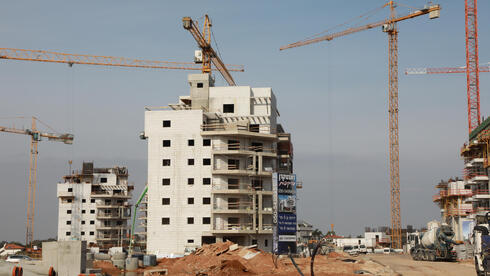Home sales in Israel rose slightly in August, with 7,632 apartments purchased — a 2 percent increase from the same month last year — despite a month-over-month decline, according to new figures released Monday by the Finance Ministry’s chief economist.
When excluding sales under government subsidy programs (which this year for the first time passed the 1,000‑transaction threshold), free‑market transactions totalled 6,572 apartments — a 4 percent decline compared with August 2024 and a 9 percent decline from July.
Sales by developers in the free market fell, while moderately increased activity was recorded in the resale market (previously occupied apartments). Developer sales in August came to 3,171 units including subsidized ones — a 5 percent drop from a year earlier, reflecting the sharp rise in subsidized‑transaction volumes. Excluding subsidized units, developer sales in the free market reached 2,111 apartments, representing a steep 20 percent fall.
Ministry officials noted that although this decline is less dramatic than in the previous four months, it was partly driven by a sales promotion in the Netanya area. In demand‑zones in the center of the country, developer sales continued to fall at sharp rates.
The share of new‑build apartments purchased “on paper” (pre‑construction) in August stood at 64 percent — up three percentage points compared with both July and August 2024. The ministry’s analysis of reported financing incentives offered by developers showed a significant decline in the incidence of those incentives compared with the prior month. Among the five regions studied, financing‑incentive prevalence was 26 percent; the reduction was particularly marked in the Tel Aviv, Central district and Netanya zones. By contrast, incentive incidence remained stable in the Be’er Sheva area.
Resale‑market transactions in August amounted to 4,461 apartments — up 7 percent from August 2024, but down 16 percent compared with July. On a multi‑year comparison of August transaction volumes since the early 2000s, the Ministry said that despite the year‑on‑year increase, the level remains very low.
The ministry noted that in several large cities where developer‑sales volumes have sharply declined year‑to‑date (January–August 2025 compared with the same period in 2024), there was a substantial increase in resale transactions. This trend was most notable in Tel Aviv, Bat Yam and Beit Shemesh, where stocks of unsold new apartments remain high.
Investor purchases in August were 1,099 apartments — a 10 percent drop compared with August 2024, following steep declines since April. Despite the low level in the previous month, the August result was up 41 percent month‑on‑month. Further, the share of new‑build apartments in this segment continued to fall.
The review also examined purchases by non‑resident foreigners (included within the investor category). In August, foreign‑resident purchases totalled 117 apartments — a sharp 28 percent year‑on‑year decline, continuing steep falls since April. Compared with July, the decline was 10 percent. Foreign‑resident sales in August reached 46 apartments, compared with 26 in August 2024. Thus, net purchases by foreign residents in August amounted to 71 apartments, down from 137 in August 2024. Geographically, about half of those purchases in August were in the Jerusalem region; in Netanya and Tel Aviv foreign‑resident buyers acquired 17 and 15 apartments respectively.
Total investor sales in August were 1,242 apartments — a 5 percent rise from August 2024 but an 18 percent fall from July, mirroring the pattern in resale‑market transactions. First‑time‑buyer purchases in August reached 4,571 apartments — a 6 percent increase from August 2024 and a moderate 3 percent rise from July. Excluding subsidized‑program sales (which were relatively high in August), first‑time‑buyer transactions in the free market came to 3,511 apartments, a 3 percent drop from August 2024 and a 5 percent decline from July. The central region of the country stood out with sharp falls in this segment.
Purchases by home‑improvement / upsizing buyers in August totalled 1,962 apartments, unchanged from August 2024 but a plunge of 17 percent from July. The “downsizer” share (buyers seeking smaller housing) was 23 percent in August, a notable decrease from the prior month and a drop of three percentage points compared with August 2024.
